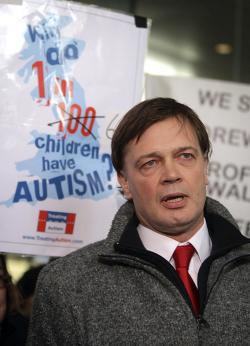The measles outbreak in Wales may have claimed its first victim.
According to the Guardian, a 25-year-old man was found dead in his apartment in Swansea Thursday. Gareth Colfer-Williams was known to have measles at the time of his death. What’s not clear is what the actual cause of death was; he was an ill man, apparently suffering from severe asthma. We’ll know what the exact cause of death was soon enough, I imagine. But his having measles at the time is very, very suspicious, and more tests will be run next week.
Either way, this tragic death has focused attention again on what’s happening in Wales. More than 800 people have been diagnosed with measles in Swansea in this recent outbreak. People are lining up to get their vaccinations, and a campaign has been started to get more people vaccinated, which is a good thing; I just hope it’s in time. But with so many people contracting the illness, serious repercussions are almost inevitable.
Wales has had low Measles/Mumps/Rubella (MMR) vaccination rates for some time … since about 1998, in fact, when Andrew Wakefield published his bogus study in the Lancet falsely linking the MMR vaccine to autism.
It’s easy to lay all this misery at Wakefield’s feet, but there’s plenty to go around. The Lancet should never have published it (many of the co-authors later withdrew their names from the paper). Tony Blair, then prime minister of Britain, declined to reveal whether his own son had gotten the MMR vaccine, prompting rumors it wasn’t safe. (Bizarrely, years later, Cherie Blair, Tony’s wife, said they had given their son the vaccine; how many people would’ve been spared misery had they simply stated the truth?) Newspapers printed ghastly articles linking vaccines and autism. And groups like the Australian Vaccination Network spread—and continue to spread—outright falsehoods about vaccines. Many of these groups actively support Wakefield.
Measles is a terrible, terrible disease. On average about 1 in 1,000 people who contract it will die. Even those who don’t die have a terrible time of it. One in 20 children with measles gets pneumonia. One in 10 gets an ear infection. One in 1,000 gets encephalitis, which can lead to brain damage.
Yet measles can be easily prevented by getting the MMR vaccine. Andrew Wakefield can point fingers all over the place, but in the end a lot of this comes back to him. Given what we’ve learned in the years since his report was published, this wasn’t the case of honest researcher being wrong. His research was unethical; it has been called fraudulent by the British Medical Journal; and it caused Wakefield to be struck off as a doctor in the United Kingdom—like being disbarred. He stood to make multiple millions of dollars from a substitute vaccine he was working on at the time, yet that huge conflict of interest is never mentioned by him or the antivaxxers who stubbornly support him despite all the evidence.
His misdeeds still echo in the hallways of medical centers in Wales. The Australian Broadcasting Network show Lateline—which has been shining a light on antivaxxers for years, bless it—recently ran a segment about the situation in Wales.
At the two-minute mark the reporter talks to a young man whose mother decided not to vaccinate him when he was a child. She is interviewed at the 2:34 and states very clearly it was Wakefield’s research that scared her off giving her son the vaccine. She has changed her mind now, saying the research was “flawed,” and knows it’s important to get vaccinated.
Good on her. You don’t want to live to regret your decision, like this father did. Or this young mother.
But starting at 4:50, the reporter talks to a woman who thinks her son’s autism was triggered by the MMR vaccination. The woman says, “I can only tell them what I’ve seen with my own eyes. I’m not a doctor, I’m not a scientist. I can only look back on what happened to us.”
And that’s what we face. Personal anecdotes are very powerful, so powerful they can easily sway someone even when on the other side of that argument is a vast, overwhelming amount of data from people who have spent their professional lives doing the careful and exacting research.
That’s why I always talk about keeping my own vaccinations up to date, and how my daughter, now a teenager, had all her childhood vaccines, as well as the Gardasil HPV vaccination. My own personal story is one of love for my family, care for my community, and the desire to do what is right based on the best evidence available.
But the fear people have keeping them away from vaccinations, and the epidemic in Wales that is the product of that fear, that is the legacy of Wakefield in spirit or in deed. As we can see from the personal testimony of people in Swansea and the doctors who are desperately trying to help, what’s happening there is a direct descendant of his unethical actions 15 years ago.
My thanks to David McCaffery, Rachael Dunlop and BABloggee Chris Ward for links.
